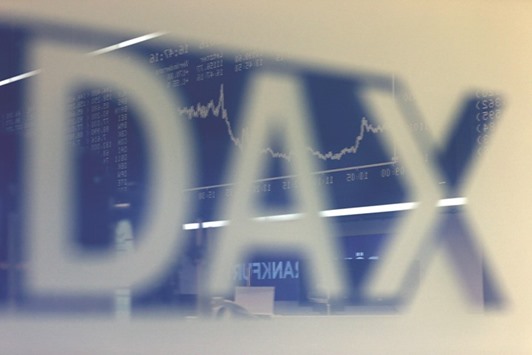European stock markets rose yesterday after the European Central Bank extended its massive bond-buying programme, signalling that the eurozone’s fragile economy can count on its continued support.
European bonds also firmed on the prospect of further ECB asset purchases, while the euro slipped against the dollar in very volatile trading.
Across Europe, London’s FTSE 100 was up 0.4% at 6,931.55 at close; Frankfurt’s DAX 30 rose 1.3% at 11,179.42, while Paris’ CAC 40 gained 0.9% at 4,735.48. The EURO STOXX 50 rose 1.4 % at 3,185.79.
The ECB’s announcement that it will scale down the size of its purchases starting in April wrong-footed markets, but investors quickly snapped out of their surprise.
“The ECB’s liquidity sink is still filling up,” observed Neil Williams, chief economist at Hermes Investment Management.
Even at reduced levels of bond-buying, the ECB “is still looking to inject an extra €540bn”, he said.
The programme’s extension “reassured markets and increased the visibility on next year”, Daniel Larrouturou, at Diamant Bleu Gestion in Paris, told AFP. “There was nothing disappointing about the ECB’s action,” he said.
ECB chief Mario Draghi said that the bank had not even discussed actually “tapering”, or winding down, asset purchases.
“The big picture,” said John Higgins at Capital Economics, “is that monetary policy in the eurozone is on track to remain exceptionally loose for a very long time to come.”
“The ECB has delivered a taper with a twist,” said Craig Erlam at Oanda. “The number of purchases has been reduced but the expiry has been pushed back to December, rather than September which is what was expected.”
Global stocks have rallied this week, propelling the Dow on Wall Street to successive records – and put it on course to hit 20,000 for the first time – while the S&P 500 also clocked up an all-time high Wednesday.
Yesterday the Dow was a touch firmer around midday in New York business.
Tokyo ended 1.5% higher, while Seoul surged 2% and Sydney, Taipei and Manila piled on more than 1%.
Shanghai though dipped 0.2% despite Chinese trade data showing a forecast-beating jump in imports and exports that indicate the world’s number-two economy continues to stabilise.
Japanese traders meanwhile brushed off data showing the world’s number-three economy grew slower than initially thought, with the government offering a glimmer of hope by revising up its forecasts for the first and second quarters of 2017.

The German share price index DAX board is reflected in a glass at the stock exchange in Frankfurt yesterday. The benchmark DAX 30 rose 1.3% at 11,179.42 for the day.
